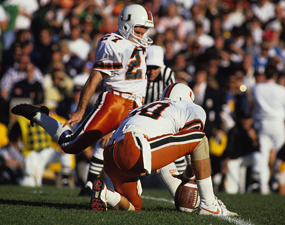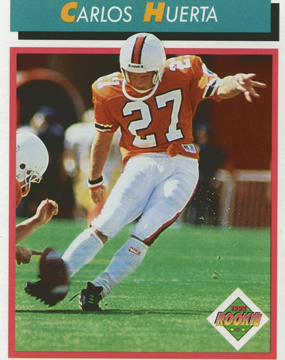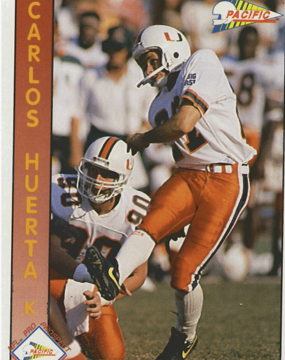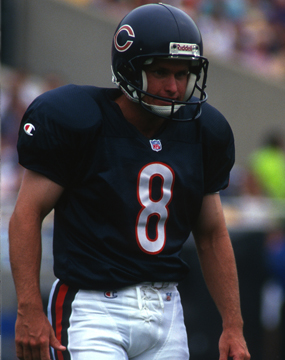
proCanes.com is continuing our “Tracking proCanes” feature with former University of Miami, Chicago Bear, Las Vegas Posse and AFL kicker
Carlos Huerta. Huerta, the starting kicker on Miami's 1991 National Championship team, emerged as a walk-on and became a consensus All-American and First-Team All-BIG EAST selection. Huerta, who later played with the San Diego Chargers and Chicago Bears, established an NCAA record with his 157 consecutive point after attempts (PATs) during his career as a four-year starter (1988-91). He ranks second on the NCAAs all-time scoring list with 397 career points, including 73 field goals. Additionally, Huerta still holds Miami records for career PATs, career field goals, career points, the top three records for consecutive PATs in a season, the top four records for field goals in a season, the top three records for points scored kicking in a season and field goals in a game. During his four years as a starter Huerta led the team in scoring each season. His foot was a significant reason in historic victories, such as hitting a field goal with 43 seconds remaining to give UM the 31-30 edge over the Michigan Wolverines in Ann Arbor in 1988. Huerta also hit game-winning field goals over Arkansas in 1988 and Michigan State in 1989.
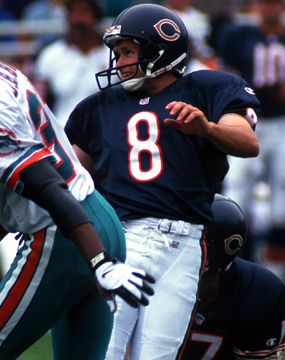
After playing his college football at the University of Miami, Huerta joined the Las Vegas Posse, a Canadian Football League expansion franchise. He was one of the lone bright lights, kicking 38 of 46 field goal attempts and scoring 154 points, and winning the Jackie Parker Trophy, which was good for runner up for the CFL's Most Outstanding Rookie Award. After Las Vegas folded he moved to the Baltimore Stallions, where he hit 57 of 72 field goals and scored 228 points, and was part of their 1995 Grey Cup championship season.
The National Football League followed in 1996 and 1997. Huerta played 3 games with the Chicago Bears in 96, hitting 4 of 7 field goals, and one game with the St. Louis Rams in 1997, scoring 2 converts.
From 1998 to 2001 he played in the Arena Football League, with the Florida Bobcats in 1998 and the remainder with the San Jose SaberCats. He would connect on 37 of 85 field goals in the AFL. Also in 1998, Huerta appeared in a playoff game with the Toronto Argonauts of the Canadian Football League.
proCanes.com: Let’s first give an idea to proCanes.com fans as to what you are doing in Las Vegas.Carlos Huerta: I have a real estate and development investment company. I’m also a licensed real estate broker, but I don’t really broker real estate for commissions more so for trading them and buying them for portfolio or investment for future sale or income. Most of my investors are from Israel and I do have investors in the US as well. I’ve been living in Vegas since 1994 and have had my real estate company for a little over 14 years.
pC: How did you get into real estate?
CH: I always wanted to get into real estate since I was in college or before and when I was in the MBA program at the University of Miami, I was still playing football, but I was kind of looking at a future career and I knew that the west was where the growth was and knew that they needed finance people. I have a finance background so I kind of went out there with a mission to get into that.
pC: So you grew up in Coral Gables?
CH: No, I wish. Coral Gables is one of my favorite places in the world. I love it here. I was born in South Miami hospital, but before I turned one [years old] my father started a business in central Florida so we moved to Orlando and lived there for 11 years and then we moved back after he got a job offer here. I went to junior high, high school and college here so I mean I partly grew up here, obviously throughout my five years at UM and one year we lived in Coral Gables before I went to UM. I went to Christopher Columbus high school and Belen before that. So 7th, 8th and 9th grades, I went to Belen and then Columbus after that.
pC: So were you always a Miami Hurricane fan growing up?
CH: I became a huge Hurricane fan when we moved back and that was the Jim Kelly era. I started getting into that and then when Kosar came in, I was an off the chart Hurricanes fan and would go to the Orange Bowl for games. I liked to sit in the student section and do that whole thing. I would sneak down there when I was in high school, it was just off the charts. Prior to that when we lived in central Florida, believe it or not, I was kind of a Seminole fan because we had the Bobby Bowden show and they were pretty good and I didn’t really know about the Hurricanes actually. I was a Dolphin fan always and then an FSU fan but when we moved here for junior high I started becoming a huge Hurricane fan. So, when I was in high school I played some football as a kicker, I really didn’t play any other position. I was playing soccer and I actually thought I was going to go and be a soccer player in college and I had some scholarship offers but none in football and my soccer coach, who I respected a lot and kind of looked out for me, suggested I try to go play football in college. He was kind of saying; ‘hey you’re not good enough in soccer.’ [Laughter] Actually I got hurt a lot, I just kept getting my ankles hurt, so I kind of took his advice and I considered a bunch of different schools. I was kind of a recruited walk-on from a bunch of different schools; Oklahoma State, Tulane, Colgate. I just said, if I’m going to play and I’m going to make the sacrifice and have to pay for school and be a walk-on, I might as well go for the gusto. If I play, I only want to play for UM which ended being the best decision I ever made. But it was a naive and dumb decision. Dumb. Dumb. I was naïve and young because I really was very, very fortunate that I even ever had a shot to play here.
pC: How did that happen?
CH: I was a walk-on. I was on the scout team. I used to have to run plays and call plays and I felt like a slave my first year. I would get beat up on by the lineman in drills and they outweighed me by over 100 lbs. It was crazy and I never dealt with that before so that first year I was a redshirt. Our kicker in Miami was a second team All-American. Greg Cox. He had a phenomenal season and no one was going to beat him out and it was not even a consideration. So, it was kind of like pay your dues, hang out, and maybe next year you’ll get a shot. I did that kind of reluctantly, I wanted to quit like three times. I think one time I was so pissed I didn’t come to practice.
pC: Were you the scout team quarterback?
CH: No they just used bodies for drills. They make you run plays against their…
pC: First team defense [Laughter]
CH: Yeah and I used to have to hold up chains for the first down marker. When Gary Stevens was doing his offensive play calling and scrimmaging during the practices they would want someone to speak into the microphone and record what the play was on microphone before the play so that when they’re watching video someone would be saying this is whatever play. I used to have to do that every drill and Gary Stevens was a hard ass, so he wanted you to do it into the mic and he wanted all the players who were not in the play to know what the play was so they could track it. So, he’d want you to go up and tell them what the play was, but they’re standing the width of the field, 63 yards, and you’re having to go tell them all but then if you said it too loud he’d yell at you because he didn’t want the defense to hear what it was so that they could stump the play. So, sometimes you’d kind of be in a hurry and you’d have to go say it and you’d say it too loud and he’d curse at you ‘don’t say it so loud!’ There would be times when I was just so mad from being told what to do. I had a huge chip on my shoulder and I just wanted to go out there and kick but I couldn’t, so I had to deal with that. The only times I could actually practice kicking was when everybody went inside then they’d give me the balls so I could kick and practice.
pC: So you didn’t practice the whole season?
CH: The whole season, never. Ever, I mean a little bit during two-a-days because they would give everybody a try but no one is really paying attention unless you’re the starting kicker.
pC: So that was the first year?
CH: That was my redshirt season which was 1987 and they were National Champs and undefeated. So it was a phenomenal team and season. After that season there were three kickers on scholarship. One of them which came from Ft. Lauderdale Eli high school, Sum Kim was his name, and he was the scholarship guy and the heir apparent to Greg Cox. He was very talented and had a strong leg and everything and really wanted to play football and was really into it. He had received a scholarship by Miami after he had hurt his knee playing soccer and had a reconstructive knee surgery. He was still really good in high school went to the surgery and passed all the tests and they said his knee had fully recovered. The first season during our redshirt season he was fine and kicking well but something happened toward the end of that year where his knee started to get really aggravated again so come spring ball, I don’t even think he was able to kick or he was half of what he was, so now they were kind of looking. There was still another scholarship kicker they had brought in and they had a returning kicker who was earning a scholarship who was the kickoff specialist who was a really good kicker as well. So, when Kim kind of started hurting, they kind of started giving me a shot to compete with the other guy and it ended up that I ended up battling it out with the kick off specialist and it was probably the hardest thing I ever did in my life.
pC: Who was that?
CH: Edgar Benes. He had an extremely strong leg. He could kick the ball a lot further than I could especially on kickoffs, but I worked real hard, I was very intense and I kind of convinced Coach Johnson one day to give me a chance because I felt they would kind of look at me, but not really give me a chance. You know I was undersized, Cuban, not on scholarship, they don’t want to give up a scholarship kid for a walk-on, it doesn’t make business sense and then they didn’t want to have to give me a scholarship on top of that. I kind of convinced him to give me a shot. I got in his face one day and nobody really did that, and I think he was kind of impressed by that and so he nodded kind of with this nervous chuckling nod and said ‘okay I’ll put you in’ because I think he kind of thought he would call me on my bluff. He put me in during a scrimmage and I did really well in the scrimmage and everybody kind of got excited and from that day forward I wasn’t the favorite or anything in spring ball, but now they started giving me looks. Come two-a-day practices before the season they needed to find a kicker, our opening game was against number one ranked Florida State. We started competing for the job and it became very clear then that Kim could not even kick. I don’t even think he could even make it out to the field; his knee was pretty much done, so I ended competing against Edgar. I ended up getting in really, really, really good shape that off-season and the competition was so intense that it was almost a war of attrition. Whoever’s leg gave out on him first lost and I got with the training staff to help me a lot and I just was able to last longer than he was.
Everybody kind of laughs at kickers and I know all the jokes, but you really can compare it to a professional pitcher or a college pitcher that can only pitch a certain amount of pitches. Well they don’t have that concept for kickers even though it’s the same thing because your hip joint takes all the abuse and it’s only got a certain amount of tendons and ligaments that can handle it. Edgar was really competitive so his leg just tired out on him and mine was kind of like rubber at that point, and I could just keep going. I really credit Jimmy Johnson, though. I think I owe him my career. He taught me how to really focus, which was crucial for what I did later on as the field goal kicker because I was a four-year starter. He was so determined to have the best guy out on the field where he was willing to even give the walk-on the job, reluctantly, but he was willing to do it. Other coaches wouldn’t even look at you, so I really respect him for that and I kind of owe him my career
pC: So, you did kickoffs and field goals or did they keep Edgar on as the kick off specialist that first year?
CH: As a redshirt freshman I only did field goals and extra points and Edgar still did the kickoffs. He did very well. He went on to law school and then the next year I did everything.
pC: Is that a lot more difficult? In those days we were scoring a lot more points so it adds a lot and tires your leg out more doesn’t it?
CH: Yes it taxed me. I’m not that big and strong to begin with so I had to really use all the power or strength I could muster to kind of be adequate, so it’s tough and then it’s a bit different because field goals you’re really kicking for accuracy. I know it’s still kicking but it really is kind of a different motion unless you’re so strong. You know, NFL kickers today are 6 feet 6’2 [tall], one guy is 6’5. They’re extremely powerful but unless you can go to the ball like those guys can, where they just go into it easy and can make a 50 yard field goal without blinking, it s not that easy to do . It’s harder than it looks.
pC: You look at a guy like Matt Bosher, currently UM’s kicker, who does everything. That’s got to be really hard especially because punting is totally different, right?
CH: Oh, way different. And one negatively affects the other. Punting actually hurts your kicking. The motion is so different and it’s kind of muscle memory and its still similar enough where I think there are times when you actually go to kick and your muscle takes over and you do a punt and you could absolutely blow your kick. It takes a whole lot of dedication, concentration, focus and talent to be able to go out there and effectively do all three of those things. He’s a very strong kid, he’s very talented and yeah it requires a unique guy to be able to do all that and at the same time you’ve got to avoid injury because one little pull of a muscle, you lose everything. I mean if it’s the wrong muscle you can’t do anything.
pC: So the kicker situation had to be pretty bad for them since it’s so difficult for a kicker to do all three.
CH: Either that or he’s that good. I mean the guy was the MVP of the team last year.
pC: You think he could make it in the pros?
CH: Yes, I think he’s prototype. One of the things that the pro scouts used to say about me is that I was too small. You wouldn’t think that’s an issue but it is for them. He definitely has the size and the strength and now the resume. You know he’s not an NFL kicker yet but he’s got the right resume to get those kinds of looks. I actually am banking on him being a pro.
pC: Have you talked to him?
CH: Minimally. If I see him I do. Every once in a while I’ll email him. I haven’t this season actually, but he doesn’t need much help, I don’t think. Yeah I might mess him up, so I stay away from him.
pC: Are you superstitious or were you superstitious because a lot of times they say how superstitious kickers are? Did you have a certain ritual a cross?
CH: No, not a cross guy. No, I’m Cuban and a catholic, but no. Well first of all I learned later on after my UM career, that rituals are actually a very good thing and they’re recommended by the top sports psychologists. So, ritual is one thing, it’s different from superstition. As a freshman and sophomore I would say I was ritualistic and superstitious as much as anybody. Like I didn’t want to step on white lines or I had all kinds of crazy things. I also felt balancing was important, so if I did something with my left hand, I had to do it with my right hand or my energy would be thrown and then I started to realize or somebody pointed out how I was and I thought this is really ridiculous, I’ve got to get over this stuff! My last couple of years, I was obviously having success on the field, so I had a little bit more confidence and I started to make a point that I was going to rid myself [of the superstitions]. I made a point to try and get rid of every single superstition I had and it was kind of tough, but in a way I kind of enjoyed it and took it up as a personal challenge. I said I’m going to stay in good shape, I’m going to kick well and I’m not going to be superstitious anymore. So I rid myself of those and it was kind of fun actually.
pC: And you started rituals instead?
CH: No, not really but I mean I think athletes and especially lets say a kicker or quarterback that has to do the same motion again and again they actually recommend that you get in the same habits so it becomes the same to you and you take every situation [the same] and keep it as close to the same as they can. Obviously if it’s very windy or if it’s very cold outside you’re going to have to make an adjustment or if the field is slippery you might have to wear different shoes to get traction, so you can’t be in a bubble, but you want to keep it the same as much as possible. You want to warm up in the same way as you usually do so your body is used to it, so it’s all familiar. Familiarity is good, having been there before in your mind increases your confidence which normally increases your peak performance so all those things are considered very prudent things. So, I started getting into those things and then I got into sports psychology, not for a career, but learning about it and I read some books and one specific book made a huge impact on my performance. I didn’t read it till after I left college but it took me to a whole other level kicking wise when I was playing in the pros and it was amazing.
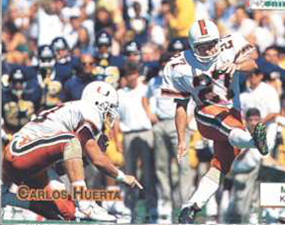
CH: Even physically. Both. The book was written by a PhD but he was also a pro tennis player before that. The book’s concept is for an athlete to reach peak performance. It was recommended to me by a friend of mine. I didn’t even know about it and then I’ve since recommended it to other people. It breaks away the accepted schools of thought on a lot of things you take for granted growing up; that all coaches are correct, a lot of them are really crazy and it validated a lot of the right things to do and what to focus on.
One really interesting concept to me is the ability to be graceful under pressure or to be clutch as people call it. Well, my high school coach started calling me the ‘Ice Man’ because I did well under pressure but then that kind of became something that I kind of believed myself and other people started to know and started taking that for granted saying ‘the guy is good under pressure’ and so I said “okay I’m good under pressure” and started thinking that and normally I was. Well, the thing that a lot of people will say is you’re born with that and I also believe that. So, I was experiencing success and I accepted this school of thought, but I started learning in this book that that’s the furthest thing from the truth. You actually learn how to be good under pressure. And it turns out that I had experiences in my athletic career that taught me how to deal with it and how to channel it properly, it wasn’t that I was born with it. So, that was I guess one of my talents that I did perform well in really important situations not that I was such a talented athlete or an amazingly strong leg kicker but that was one of my attributes. I always had a strong leg, relatively speaking, so I took free kicks all the time in soccer when the game was on the line and I started learning how to do that and my high school coach was also really good and would train me in practice and put a lot of pressure on me so by the time you got to the game the game was easy compared to having some maniac yelling in your ear telling you he was going to cut you or kill you if you don’t make it.
Then I got here and Jimmy Johnson would do the same thing, the training was so intense he was screaming and yelling you need to make this kick or we’re going to lose the national championship. Every practice was intense but when I got out in the game and he was far away on the sideline; it was easy, he’s not screaming in my ear. It was something that was learned but actually learning about the fact that that’s actually something learned and then being able to take steps to practice it and be okay with it. So that took me to a whole other level performance wise but then the book also focused on that you can be the most cool cat in the world but if your fundamentals stink you’re going to stink, so I really started focusing more on my fundamentals and on my physical well being. I started learning that when my body fat was down and I was doing well in the weight room and I was doing my sprints [I would perform better]. My body was really toned and the ball really flew of my leg. I got to the CFL, well I first was cut a couple of times in the NFL and then I got to the CFL and especially on away games where we would go to opposing teams’ stadiums to practice, usually we’d practice after their walk through and the other team started stopping in shock to watch me kick in warm ups because I’d be kicking 60 and 65 yard field goals down the middle and here I am this 5’8 skinny guy, well I was a little muscular but overall I’m not a very big guy, and it was kind of a freak thing to watch. So I just really learned a lot and that book kind of did it applying the concepts and focusing on things that were only going to make me better at what I did. So I’m all into that.
pC: You were a clutch kicker, as they call it, so when you got into those situations, coaches would call a time out try and ice you, does that actually work?
CH: Let me ask you a question. If you’re in a physics class and your very advanced physics professor says look I need you to really analyze the theory of relativity and prove Einstein is wrong, would you rather have a day to do that or would you rather have 40 days?
pC: I’d take 40.
CH: If you’re going to make a game winning field goal against Notre Dame and it’s from a pretty good distance, would you rather have time to properly center yourself, take the right steps, make sure you’re aligned properly, make sure that your center is comfortable, and not off balance so he can center the ball back appropriately, that you’re holder is ready to take the ball? You always want more time.
That icing the kicker thing is the dumbest thing ever. But there aren’t any kickers who are head coaches and most of the coaches believe this false fallacy and they continue to do it and I just roll my eyes. If you’re a kicker that’s worth anything you want to be out there and be able to set up, make sure you’re understanding the wind, check you’re plant foot and make sure the grass isn’t going to give out from under you and other things. It’s just asinine.
pC: At least someone puts that to rest.
CH: Nobody will listen.
pC: I guess if you’re a current kicker you’d never admit to it because you want the opposing team to keep using timeouts.
CH: I hated to be rushed because then, it isn’t like you’re practice. You want to do it like the practice.
pC: What was the longest field goal you’ve ever made?
CH: In Canada I made a 59 yarder, in college a 54 yarder. In the NFL I think was like a 46 yarder or something. I didn’t play long in the NFL though.
pC: You were with the Bears and your stay with them ended in controversy. Talk about that.
CH: First of all Dave Wanstedt didn’t really know what he was doing when it came to special teams and he kind of screwed a lot of things up, but that’s a long story. The other controversy, I mean I was a good kicker I should have lasted longer than I did, but the other controversy was that the Bears in 1985 they won their Super Bowl. They are still legendary in that town and I took the place of Kevin Butler who was the last remaining Chicago Bear from the ‘85 Super Bowl and everybody loved ‘butthead.’ I took his job and they hated me because of it, even my teammates.
pC: So that must have made it pretty miserable for you.
CH: Yeah I hated going to work everyday.
pC: Obviously your performance isn’t going to be very good on game day either, or as good as it could be let’s say.
CH: At that point it was Adam Vinatieri’s first year. We all know what he became. I used to train with Vinatieri. He has a much stronger leg than I do, but at that time there was no comparison on who was more accurate. When we went on the field he might have the stronger leg but I would blow him away kick after kick. He was I think 2 for 7 and had missed 3 extra points and they didn’t cut him. I think I had missed 3 field goals no extra points, two of the field goals I’d made I shouldn’t have even kicked because the snap was so bad I had to stop mid stride on a 44-yard field goal I remember. Wanstedt had won the first game against the Cowboys and I kicked two field goals in the 4th quarter to kind of ice the game. It was Monday night football and they were Super Bowl champs. But then we lose two games and Wanstedt was the type of guy that when he was feeling the heat, he always found a scapegoat and I was the scapegoat for the week. Sometimes it was his quarterback and that’s what he was. But whatever, you don’t have much of a chance to make it, that was my chance. I then I played for the Rams and then never played again.
pC: Did you want to keep playing? Was it tough to stop?
CH: I wanted to keep playing. I went to the World League after that and went to the training camp with the Buffalo Bills and had a great training camp. But Steve Cristie was like an all-pro kicker, I didn’t make it. In my career I went up against John Carney, who still was kicking until this season till he was 45 years old, made it to the Pro Bowl a lot of times. I went up against Al Del Greco who when I was up against him, was probably kicking better than he ever has. Butler and then Steve Cristie and in the NFL there’s no back up kicker, you’re either a starter or you’re gone. So all these guys were really, really, great kickers and I just wasn’t in the right place at the right time and I’m not so talented where I can just show up and make the coaches say ‘wow I want this guy.’ I was just a guy that performed really steadily all the time. I think to this day I’m still the most accurate kicker in the history of the Canadian Football League. I did get hurt too.
pC: What did you injure?
CH: I injured my kicking leg and I didn’t quite come back until it was kind of too late. I wanted to keep playing but I got into a situation where I felt that I was in the best possible situation in college that anybody could actually dream of being in. It was my hometown, my favorite team, we were champs every other year and I was kind of a star player towards the end. I knew what success was. To go to some of these pro franchises and win three, four, five games and be under coaches who were not a Jimmy Johnson, not a Dennis Erickson and then the Canadian League, where we were Grey Cup Champions. They were so amazing to work under and I’d go to guys that weren’t that and think I don’t want to be here. I was spoiled. I’m not going to get to really perform like I should under theses guys, so I was kind of starting to try and look for the right situation where I could be under a coach that I felt was worth playing for but I wasn’t good enough to necessarily always get that opportunity. But it’s tough to take a step back like that.
We would like to thank JC Ridley of
www.caneshooter.com and
dailycaneshooter.blogspot.com for providing us with Carlos Huerta's Chicago Bears photos.
Click here to read Part II of our exclusive interview with Carlos Huerta to read what Huerta has to say about Coach Johnson and Coach Erickson, how he got the number 27, where he thought the toughest place to play was, what he thinks of the current state of Hurricane football and much more!
Click here to order Carlos Huerta's proCane Rookie Card.





